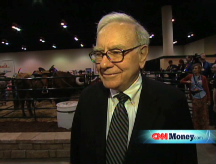Welcome to the 'recession'
Buffett says we're there. Greenspan says we're likely so. It may not be official, but the question is: How long will the funk last?

NEW YORK (CNNMoney.com) -- It's getting harder and harder to deny that the economy is in recession.
Warren Buffett, the world's most famous investor, proclaimed this weekend that "we are already in a recession."
Former Federal Reserve chairman Alan Greenspan told the Financial Times on Monday that there is a greater than 50% chance of a recession.
But with all due respect to the Oracle of Omaha and the Maestro, they are not telling us anything that the average American consumer didn't already know: this economy stinks.
Whether the economy is technically in recession is missing the point. Consumer confidence is anemic. Home prices continue to fall. The unemployment rate has risen sharply over the past few months. Food and energy prices are soaring.
In fact, gas prices have run up so much that Americans are even starting to give up on their love affair with the automobile: the Federal Highway Transportation reported yesterday that Americans drove 11 billion miles less this March than a year ago.
We may not find out for several months if the National Bureau of Economic Research, the official arbiter of recessions, decides to label this economic rough patch an actual recession. And the economy may not ultimately decline for two consecutive quarters, a shorthand definition.
Gross domestic product eked out a 0.6% gain in the first quarter, according to the first reading of that figure released last month. An update is due out Thursday and economists have a revised forecast of 0.9% growth.
So the most pertinent question now for consumers and investors should not be if we will enter a recession but how long will it last?
Buffett and Greenspan are divided on that question. Buffett, speaking in the German weekly Der Spiegel, said that the recession "will be deeper and longer than what many think" while Greenspan said to the FT that "the probability of a severe recession has come down markedly."
So how can two financial legends have diametrically opposed views on the economic outlook? Well, these are confusing economic times. Even the Federal Reserve seems to be uncertain of what's next.
On the one hand, the credit crunch that paralyzed financial institutions late last year and earlier this year seems to be ebbing.
Wall Street has been responding well to this development: the S&P 500 is up about 7% since mid-March, when investor fears were greatest. That's right around the time that JPMorgan Chase (JPM, Fortune 500) agreed to "rescue" Bear Stearns (BSC, Fortune 500).
And the Fed also seems to think the worst may be over on Wall Street. It has indicated that it probably won't cut further its benchmark federal funds rate, which currently sits at a relatively low 2%.
That should be good news for investors. In a note to clients Tuesday morning, Harris Private Bank chief investment officer Jack Ablin pointed out that since 1984, the S&P 500 has gained, on average, 21.5% in the 12 months following a final Fed rate cut in a cycle. "History suggests that the S&P 500 enjoys strong gains once the Fed puts their interest rate ax away," Ablin wrote.
A sustained upswing in stocks could go a long way toward lifting consumer sentiment, especially since many consumers have seen the value of another key asset, housing, fall in the past few months.
But the central bank is also growing increasingly worried about inflation in food and energy dragging down the economy. The Fed's series of rate cuts have weakened the dollar and some economists suggest that the greenback's sluggishness is the main culprit behind the spike in commodity prices.
Even one of the Fed's policymakers shares that view.
According to the minutes of the Fed's April policy meeting, released last week, Dallas Federal Reserve president Richard Fisher suggested he "was concerned that...lowering the funds rate had been pushing down...the dollar, contributing to higher commodity and import prices, cutting real spending by businesses and households, and therefore ultimately impairing economic activity."
The Fed also updated its economic forecasts for 2008 last week and the picture isn't pretty: the central bank reduced its growth target for the year while also boosting its forecast for both inflation and unemployment.
So which is it? Is the downturn almost over because banks are recovering their footing? Or is the recession only beginning thanks to runaway price increases at the supermarket and pump?
Personally, I think it's an encouraging sign that, despite many economic problems, consumer spending has held up relatively well during the past few months. In addition, the government reported today that new home sales, while still at a historically weak level, rose unexpectedly in April. Any signs of life in the moribund housing market has to be viewed as a positive
And as I've argued in several recent columns, the fact that many big corporations have ample amounts of cash that they are using on mergers as well as to buyback stock and increase dividends is a good thing. Unlike prior recessions, Corporate America may help to keep the economy afloat even if consumers pull back.
But you tell us. Post a comment about where you think the economy is heading.
Issue #1 - America's Money: All this week at noon ET, CNN explains how the weakening economy affects you. Full coverage.
Gas prices have climbed to record levels. Are you feeling the pinch? Tell us how gas prices are affecting you and what you're doing to cope. Send us your photos and videos, or email us and tell us what you think. ![]()




